3 Ways to Improve Your Training Programs with Cognitive Learning Theory Tools
BizLibrary
FEBRUARY 21, 2024
What is Cognitive Learning Theory? Cognitive learning theory (CLT) is a psychological perspective focused on the way our brains learn best.
This site uses cookies to improve your experience. By viewing our content, you are accepting the use of cookies. To help us insure we adhere to various privacy regulations, please select your country/region of residence. If you do not select a country we will assume you are from the United States. View our privacy policy and terms of use.

BizLibrary
FEBRUARY 21, 2024
What is Cognitive Learning Theory? Cognitive learning theory (CLT) is a psychological perspective focused on the way our brains learn best.

Dashe & Thomson
MARCH 14, 2019
What Are Cognitive Biases? Our brains receive non-stop input from all five senses every moment we are awake. In the face of this enormous amount of daily input, our brains develop subconscious coping mechanisms that we can use to quickly make daily decisions. Cognitive biases result when these coping mechanisms fail.
This site is protected by reCAPTCHA and the Google Privacy Policy and Terms of Service apply.

Dashe & Thomson
FEBRUARY 4, 2014
Instructional Designers often strive to develop training material that is concise and easily digested by the target learners. Learning Style Theory Cognitive Strain CRT elearning instructional design Learning Theory' They also strive to create assessments and questions that are valid, clear, and direct.

Matrix
APRIL 29, 2021
Reading is good for the brain. Continuing our series about adult learning theories series that instructional designers should know before creating training courses, we’ll explore experiential learning today. The Theory of Experiential Learning. Read more: 4 Benefits of using VR in training.

Advertisement
Cognitive science theories already supply the answers. Learn how OttoLearn packages them into a single platform you can use to deliver microlearning based reinforcement training, and go beyond completions to focus on outcomes. Learner engagement and retention doesn’t have to be a mystery.

Matrix
APRIL 27, 2021
” moment is both cognitive and emotional. The cognitive system makes use of prior knowledge and experiences all the time. This capacity to evaluate their assumptions and prior understanding offers excellent value to transformative learning. Read more: Designing online training that focuses on experiences, not events.

LearnUpon
AUGUST 27, 2019
There are lots of learning theories out there, but they are not a one size fits all thing. Your learning & development team should investigate the different theories and decide which ones suit the type of training you need to deliver, and the company culture you’re creating . Behaviorist Learning Theory .
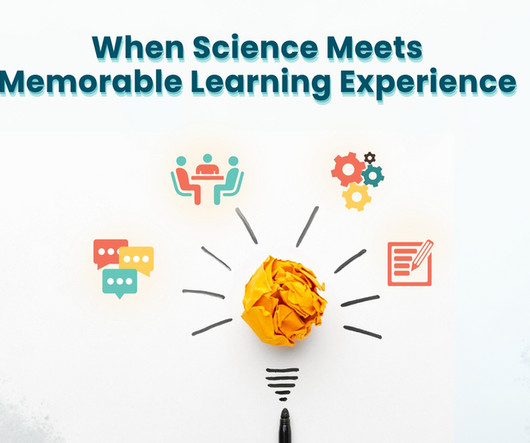
Thinkdom
FEBRUARY 29, 2024
Learning is a complex process influenced by a variety of cognitive, emotional, and environmental factors. So, how does one put that into practice while developing training modules? Thus, the use of pictures, diagrams, and other forms of visual aids added to verbal descriptions might enhance classroom learning.

HexaLearn
JANUARY 17, 2024
The Psychology Behind Effective eLearning: Comprehending The Mechanics Have you ever pondered how your brain processes information when absorbing something new? This is where cognitive psychology takes center stage in eLearning services. Building On Learning Theories Learning theories serve as guiding stars in eLearning.

STRIVR
JANUARY 20, 2023
But if you’re training employees to do their jobs proficiently, do you really have 10,000 hours to devote to training each individual person? What happens in the brain to master a skill is a complex learning process that involves three distinct stages of motor learning. After all, they’ve been well-trained.

Maestro
JUNE 15, 2023
Others see learning as a road to a better standard of living and seek opportunities to improve their job status or secure professional advancement. Sometimes, adults are learning because they are required to do so for their job. And some learn because they have a cognitive need or curiosity to do so.
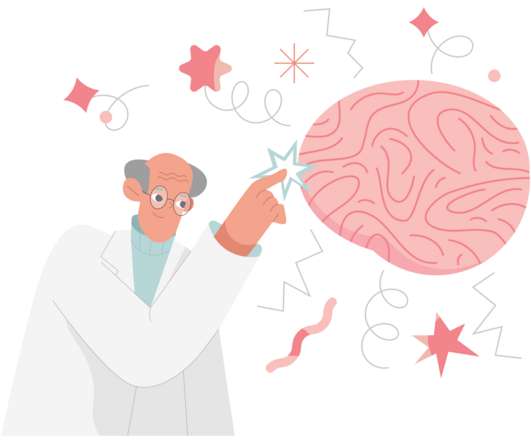
eLearningMind
MARCH 11, 2022
Have you ever wondered why it’s so easy to remember things like song lyrics and movie quotes, but trying to recall what you learned in your last training is next to impossible? You probably don’t even realize it, but those easy-to-remember earworms are engineered to maximize your brain’s response and access to your long-term memory.
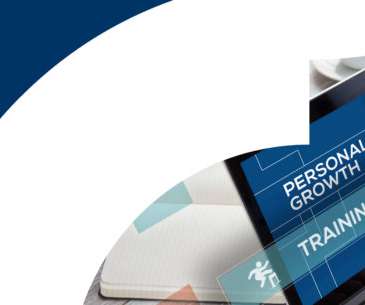
Learning Pool
JULY 17, 2020
When you look into the theoretical underpinnings of learning experience design, it can come as something of a surprise to realize that this new practice area does not lean particularly heavily on traditional learning theory (e.g. Cognitive overload (overuse of media) . Bloom, Gagne, etc.). Desirable difficulties.

eLearningMind
DECEMBER 19, 2022
It might sound familiar for your favorite novel or the last movie you saw, but what does this mean for your training materials? The good news is that you don’t need an Academy Award-winning director to create meaningful and successful training. What is the Role of Storytelling in Training? Audience Analysis.

Integrated Learnings
AUGUST 6, 2013
Cognitive theorists believe that as new information enters the working memory, earlier information is pushed out. Since the information entering at the end doesn''t get pushed out as quickly, the brain has more time to process and remember the later stuff. Why does recency matter for eLearning? A fill-in-the-blank slide.

The Learning Circuits
JULY 1, 2010
There's been a lot of discussion around cognitive theory and "how the brain learns." But even with all of that discussion there's a question of whether people are really making changes to the design of their online learning. So, it should look like: Tony Karrer - e-Learning 2.0
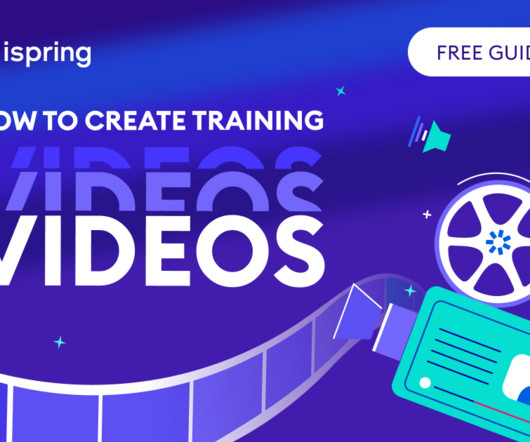
Mike Taylor
DECEMBER 1, 2023
In this one, Connie Malamed explores the effectiveness of animations in learning compared to static graphics. Animations can be effective for visualizing fast or slow processes, yet they don’t always enhance learning due to the cognitive effort required. So, selective use of animations is the key for optimal learning.

Origin Learning
SEPTEMBER 12, 2018
Understanding Social Learning Theory. Social learning theory as we understand it today primarily evolved from the work of Albert Bandura in the 1960s. His definition of social learning was – “People learn from one another, via observation, imitation, and modeling.” Social Learning.
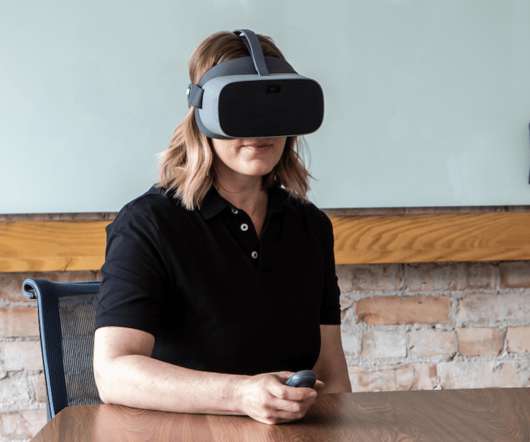
STRIVR
DECEMBER 20, 2019
Founded in behavioral and cognitive science, Immersive Learning provides a memorable tool that accelerates employees’ proficiency in their roles. With such impact, it’s important to understand what this emerging category of training is and why it works so well in an enterprise environment. What is Immersive Learning?
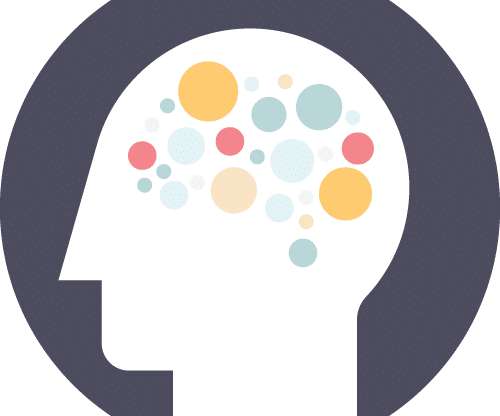
eLearningMind
NOVEMBER 10, 2022
Instead, Neurolearning is a combination of learning theory and neuroscience; a complicated study of how the brain (and the nervous system) works and reacts to stimuli and situations. For our purposes, Neurolearning helps us understand the way individuals learn and how to turn material into memories for later retention.

Zipboard
AUGUST 1, 2018
The Instructional Design trategy is majorly influenced by the requirements of the stakeholders, the resources available, the objective of the training program and how it will be delivered to the learners. What learning theory would serve the project’s needs best? What Instructional Design model is to be used?

PulseLearning
DECEMBER 18, 2017
When it comes to designing engaging and effective corporate training, the best place to start is by looking at how the human brain works – neurology. Just like vehicles need the right type of fuel to run smoothly, your brain requires the right input to for its learning processes to work as efficiently as possible.

Ed App
DECEMBER 8, 2020
Even before the global pandemic hit, however, the introduction of eLearning and microlearning were already on the rise to train professional teams. And it’s no surprise since the learning transfer is 17% higher, engagement is improved by 50% and a 300% increase has been adopted overall. eLearning market increases by 200% in 3 years.

Clive on Learning
NOVEMBER 29, 2007
Chris Brannigan of Caspian Learning alerted me to Cognitive Fitness , an article by Roderick Gilkey and Clint Kilts in the Harvard Business Review, which you can download online for US$6.50. The byline to the article gives you the gist: "New research in neuroscience shows you how to stay sharp by exercising your brain."

Learningtogo
DECEMBER 13, 2022
The good news is that we’re gaining an influx of talent with a passion for helping people learn, a sound background in learning theory, and a willingness to learn new skills. Yet, I could make the case that each element of Knowles’s theory can apply to a child as well as an adult. HR Training Bot.

Zipboard
AUGUST 1, 2018
The Instructional Design trategy is majorly influenced by the requirements of the stakeholders, the resources available, the objective of the training program and how it will be delivered to the learners. What learning theory would serve the project’s needs best? What Learning Theory Are You Using?

Clark Quinn
APRIL 17, 2010
The premise is that the world is predictable and understandable, so that we can capture the ‘right’ behavior and train it. Note: I let my argument lead where it must, and find I go quite beyond my intended suggestion of a broader learning design. Now think about learning design. We are seeing richer design models.

Learningtogo
DECEMBER 29, 2017
Instructional design, learning management systems, authoring tools, training analytics and other tools of the trade are also given to us by science. Let’s say you’re a training director getting ready to make your case for next year’s budget. “I We accept them because we know that there is evidence to back them up. Neuroscience.

Ed App
FEBRUARY 5, 2020
Gamification is utilised in training strategies to engage users in an immersive learning experience. It works to incorporate tactile functions within training modules, resulting in a sustained productive mindset and corporate success. Brain Boost. Mobile Compatibility.

TalentLMS
DECEMBER 30, 2014
Serious games or serious eLearning solutions take eLearning courses to a higher level of cognitive resonance through emotionally cognizant settings naturally found in games. Emotions create a special state of brain receptivity. Why do you think context-centric learning environments like serious games work?

Integrated Learnings
MAY 3, 2010
I recently read an article called "The Write Brain: How to Educate and Entertain with Learner-Centered Writing" by Kathleen M. Here's how she addresses those opening questions: By blending fictional and technical writing techniques with learning theory, we can craft written materials that both educate and entertain.

Ed App
DECEMBER 8, 2020
Even before the global pandemic hit, however, the introduction of eLearning and microlearning were already on the rise to train professional teams. And it’s no surprise since the learning transfer is 17% higher, engagement is improved by 50% and a 300% increase has been adopted overall. eLearning market increases by 200% in 3 years.

Upside Learning
MARCH 1, 2011
Know how work would shape up in the future, major ideas that would change the world of training and how learning would soon turn mobile. For all you Tech savvy folks, get the scoop on how technology wires the learning brain and how HTML 5 aids cross platform development. 4 Big Ideas That Will Change The World Of Training.

Performance Learning Productivity
JUNE 27, 2016
The Amazing Phenomenon of Language Learning Children usually learn to speak their parents’ or social group’s native language relatively easily. The experts tell us that our brains are naturally ‘wired’ to assimilate sounds and create meaning. It isn’t a new interface for traditional training, nor a new learning theory.

CLO Magazine
APRIL 16, 2021
Based on my research on learning theory, instructional design, design thinking, employee engagement, organizational health and neuroscience, I created the “Wicked Learning Experience Design.”. In that time, I also learned valuable lessons from Josh Bersin’s “Blended Learning” and. Upping the training game.
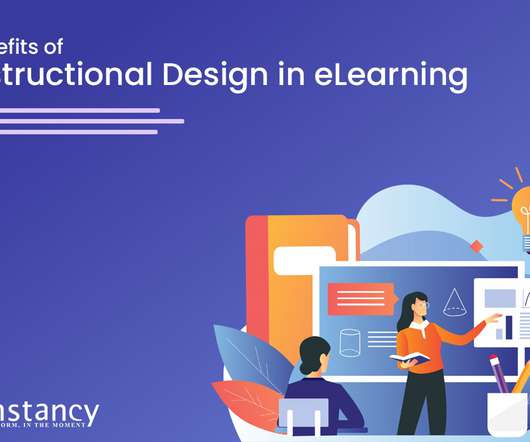
Instancy
APRIL 14, 2021
eLearning is a combination of technology and education or training. Instructional design bridges the two, keeping learning at the centre while designing and developing an eLearning course. Very large number of people around the world are now taking eLearning courses in both, formal and informal ways.

KnowledgeOne
APRIL 14, 2021
The basis of social-cognitive theory. This notion is at the heart of his social-cognitive theory, which explains human development and functioning through continuous and reciprocal interactions between personal, behavioural and environmental (or contextual) factors. Cognitive Bias: When Our Brain Plays Tricks On Us.

eFront
JUNE 8, 2017
By embedding instructions in familiar contexts, learners are more likely to learn Click To Tweet. 2) “Real world” application: Rather than teach for the abstract or theoretical world, using contextual learning strategies helps companies prepare their employees to take on real-world challenges that their staff faces in the workplace.

Obsidian Learning
MARCH 1, 2016
New post 6 Best Practices For Applying Spaced Learning In Online Training on Obsidian Learning. Are you concerned about cognitive overload undermining the effectiveness of your online training program? How To Apply Spaced Learning In Online Training. Guest contributor: Christopher Pappas.

Learning Visions
AUGUST 23, 2007
Cammy Beans Learning Visions Musings on eLearning, instructional design and other training stuff. Thursday, August 23, 2007 Kineos August Rapid e-Learning Newsletter If youve been following my blog for awhile, then you already know how I feel about the folks at Kineo. and subscribe at the Kineo Newsletter page.

Jay Cross
NOVEMBER 25, 2011
Working smarter draws upon ideas from design thinking, network optimization, brain science, user experience design, learning theory, organizational development, social business, technology, collaboration, web 2.0 patterns, social psychology, value network analysis, anthropology, complexity theory, and more.

Learnnovators
APRIL 18, 2014
ABOUT CLARK QUINN (Learning Technology Strategist): Clark Quinn, Ph.D., helps organizations align technology with how we think, work, and learn. Learnnovators: You’ve been Quinnovating in e-learning for over 30 years, helping your clients make the best business decisions. We need to get back to what really leads to learning.

Jay Cross
OCTOBER 6, 2011
Working smarter draws upon ideas from design thinking, network optimization, brain science, user experience design, learning theory, organizational development, social business, technology, collaboration, web 2.0 patterns, social psychology, value network analysis, anthropology, complexity theory, and more.

Limestone Learning
APRIL 29, 2020
Friday, May 1, 2020, 9AM – 10AM PT: You Can’t Beat ’Em, So Join ’Em — Training’s Role in Informal Learning Many of us obtain the knowledge and data we require to complete our work by using the Internet. This informal learning trend is unlikely to change soon, so training professionals need to find a way to address it.
Expert insights. Personalized for you.
Are you sure you want to cancel your subscriptions?


Let's personalize your content